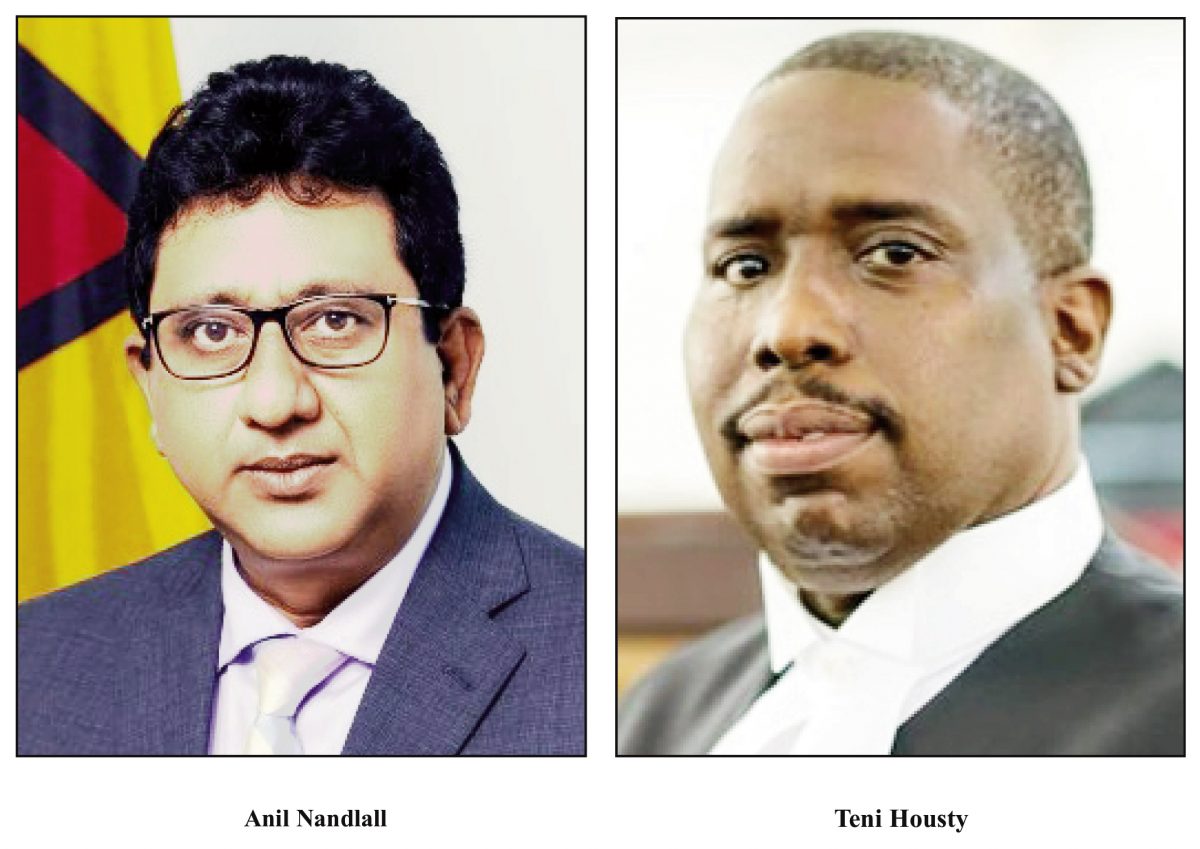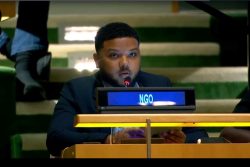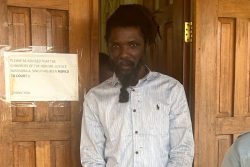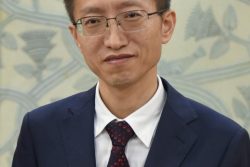Guyana is a step closer to having the Council of Legal Education of the West Indies (CLE) establish a presence here as the body at a recent meeting accepted a proposal from the government.
During a meeting with the Council of Legal Education held in Bridgetown, Barbados on September 16 and 17, Attorney General and Minister of Legal Affairs Anil Nandlall presented a case for establishment of a Council-run law school in Guyana.
Nandlall in his proposal to the council – the lawful authority for the administering of legal professional education in the Caribbean region – suggested the law school be a Council institution. His proposal states that the institution will be managed and administered by the CLE but that the Government of Guyana will provide the land and buildings based upon criteria and specifications set by the Council.
“Unlike a proposal made by his predecessor, Basil Williams, SC, which the Council rejected… this request was favourably considered, and the Council made a decision to write to the Government of Guyana shortly, informing of this decision and setting out the criteria and other requirements which the government will have to satisfy,” a statement issued by Nandlall said.
Moreover, Nandlall explained the initiative merges with the Government of Guyana’s commitment to promote Guyana as an attractive offshore education destination.
It was noted that the proposed law school is expected to attract students from across the region and further afield. It will ease the overloading which currently obtains, in particular, at the Hugh Wooding, and Norman Manley law schools.
Nandlall was accompanied by Yonnette Cummings-Edwards, OR, Chancellor of the Judiciary (Ag) representing the judiciary and attorneys-at-law, Teni Housty and Kamal Ramkarran, representing the Guyana Bar Association.
Housty in an invited comment yesterday told this newspaper that the council’s decision to expand here does not benefit Guyanese alone but all Caribbean nationals.
He opined that it is step in the right direction by opening up access to legal education in the Caribbean.
The attorney further emphasised that the new institution will solve the issue of limited space for nationals to be accommodated, and in so doing, allow them to benefit from equal access to legal education.
For years, prospective Guyanese lawyers have been at a disadvantage as they have not been able to secure a spot at one of the CLE institutions.
One of those individuals, who spoke with Stabroek News yesterday under anonymity said, “Given the longstanding constraints faced by locals LLB graduates, this is fantastic news which I know would be welcomed by many like myself.”
She said an institution as such has been a long time coming, and “I dare say it’s about time.” The talk of Guyana having its own law school is not a new one and it is her sincere hope is that it truly comes to fruition this time.
“I look forward to seeing the required accreditation being granted to set us on par with the other regional law schools so that our certification is equally recognized and respected. Having our own law school will no doubt be both convenient and more economically viable for Guyanese students,” the LLB graduate said before adding “I now look forward with great optimism to see this vision realized.”
The Council administers legal education through its law schools, the Hugh Wooding Law School, St. Augustine in Trinidad and Tobago, Norman Manley Law School, Kingston, Jamaica, and Eugene Dupuch Law School, Nassau, Bahamas.
Under the treaty, which is incorporated by legislation in all member States, holders of a recognized Bachelor of Laws degree are admitted to these law schools and upon the satisfactory completion of a course of study, are issued with a Legal Education Certificate (LEC) which qualifies them to practise before the Courts of Law in member States.
At Hugh Wooding Law School, only the first top 25 University of Guyana law degree graduates are allowed to pursue the Council’s Certificate in Legal Education.
Under the APNU+AFC government in 2017, Guyana signed a Memorandum of Understanding (MoU) with the University College of the Caribbean (UCC) and the Law College of the Americas (LAC) for the construction of the JOF Haynes Law School. The approximately US$75 million investment, it was said, would end years of problems that local students have had entering regional law schools to complete their studies.
This was a move at the time to eliminate the challenges students face in gaining admission into the Hugh Wooding Law School.
However, CLE had objected to the establishment of the school saying that no permission was ever given to Guyana to establish an independent legal education institution.
Stabroek News had reported that even as discussions were taking place between the then Legal Affairs Minister and the CLE, no permission was ever granted for an institution to be established.
The minutes of the September 2017 meeting seen by Stabroek News contained a lengthy section on the proposed Guyana law school in which several of the attendees made clear to Williams that based on the records of the CLE there had been no green light to Guyana.
A key section of the minutes said that at the urging of some members of the CLE, the Chairman of the meeting, Reginald Armour SC and Williams had further discussions at the meeting and arising out of these talks, it was agreed that “what emerged are the two decisions as recorded, namely the receipt by the Council of a feasibility study from the Government of Guyana to present a proposal to Council to demonstrate the need for a law school and, that both the Government of Guyana and the Council of Legal Education would establish independent committees to attend to this matter. In light of the foregoing, he (Armour) asked whether the Government of Guyana does not intend any more to present the feasibility study.
“The Hon Attorney General Williams SC explained that it was never agreed that the aforementioned feasibility study was meant to be solely for Council, and that they had an MOU with two Jamaican universities with a provision for a feasibility study. He said what was agreed was that the requirements which Council had requested would be encompassed in the feasibility study to be done pursuant to the MOU. He accused the Chairman of issuing (a press release in January 2017 in Jamaica) based on information given to him by a member of the Opposition in Guyana.
“The Chairman asked that it be noted for the record that the media statement which he had issued in Jamaica was not issued as a result of anything said to him by any opposition politician in Guyana, but had to do with communications appearing in the media in Jamaica on the eve of an Executive Committee meeting, taking place in Jamaica, and which had been drawn to his attention by the three Principals of the Law Schools as to the veracity of those communications. This he did to state clearly Council’s historical recorded position after having tried and failed to make contact with the Hon Attorney General Williams S.C.
“The Chairman stated that thereafter, other Attorneys General present at CLE had persuaded him and he had withdrawn the media statement and agreed to continue discussions with AG Williams; arising from those conversations the decision that is recorded in the Abstract of Decisions was made”.
Dr Lloyd Barnett, Jamaican legal luminary, stated at this juncture that the minute, items 95 – 106 could not be interpreted as approval by Council for the establishment of a law school in Guyana. Williams had argued that several statements in CLE minutes attested that Guyana had been given permission for a law school. However, this was rebuffed at the CLE meeting in September. Barnett said from his knowledge of the Agreement establishing the CLE it was clear that the Council has no authority or power to “authorise anyone to establish a law school. The Council is authorised itself to establish and operate law schools in (certain) territories so that what was being proposed by the Attorney General can only be an application to the Council to approve the establishment, by the Council, of a law school. And that would have to be established in the context of the Caribbean approach to legal education.
“… Barnett stated that the idea that two universities can together with a Government agree to establish a law school or to create the mechanism for the establishment of a law school is completely contrary to the system that has been established by the Governments of the Caribbean”.
The minutes of a CLE Review Committee were also adverted to with the intention of showing that Guyana never had approval for a law school.









